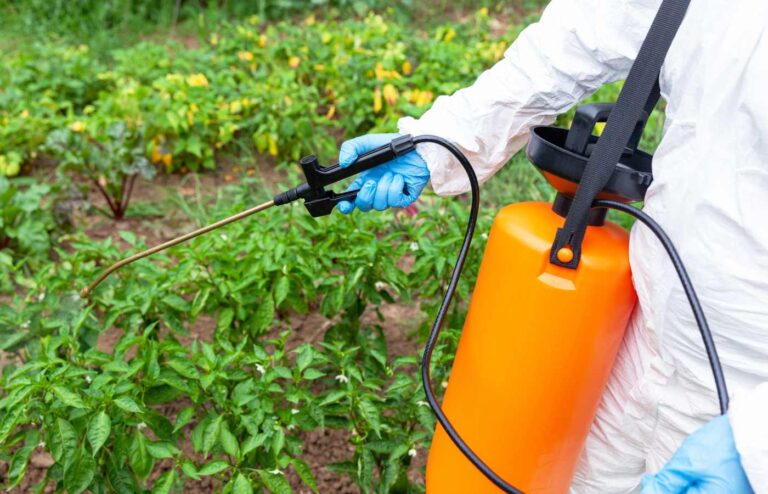
A new study has been released by the Journal of the National Cancer Institute, which further supports the link between glyphosate-based herbicides exposure and an increased risk of cancer. 268 farmers who had occupational exposure to glyphosate found in RoundUp products were compared against individuals without such exposure. Results showed that biomarkers associated with cancer risk were higher in the former group.
Since the Roundup weed killer product was introduced, it has been a popular choice for commercial and personal use. Consumers have been relying on Roundup to keep their landscapes looking healthy and manicured without having to put in much effort. However, some studies published recently have indicated that chemicals within the product may cause cancer.
In light of these findings, many people who believe they have developed cancer due to significant Roundup usage are now filing lawsuits against Bayer, its current owner.
These cases are scattered throughout the US but share a common goal: to seek compensation from Bayer for any medical damages caused by their products.
As of February 2023, court proceedings are still ongoing as both sides work tirelessly to prove their arguments for a favorable outcome.
If you have fallen victim to any medical issues brought about by heavy exposure to Roundup weed killer, consulting roundup attorney with class action experience is highly recommended.
In May 2022, Monsanto announced it had settled more than 100,000 Roundup lawsuits, paying out around 11 billion dollars in damages. There are still 30,000 cases pending, including 4,000 cases in multidistrict litigation (MDL) in California.
In MDL cases, the court can resolve some specific issues for all of them at once rather than having to answer the same question again and again in each separate lawsuit.
June 2022 saw a notable outcome for a Roundup case when the Ninth Circuit issued its decision on the matter. This further confirms that millions of people have been affected by serious illnesses (cancer) from using glyphosate herbicide found in Roundup products.
The number of lawsuits and plaintiffs is staggering, and this ruling will hopefully be another step toward ensuring justice and compensation are provided to those affected.
The Roundup lawsuit brought against Monsanto and Bayer has been one of the most high-profile cases in recent memory. The 2018 roundup litigation case went to trial where a jury found that the companies had not done enough to warn the plaintiff that Roundup could cause cancer and awarded him nearly $300 million in damages. This was the first of three cases in which substantial awards were made due to injury or illness caused by exposure to Monsanto's glyphosate-based pesticide.
Roundup lawyers of those harmed had claimed that Monsanto knew about the risks associated with their products long before they started paying out damages. Bayer bought Monsanto shortly after the verdict was issued, taking on all liability as part of the acquisition. Since then, many more cases have been either settled out of court or emerged.

The potential cancer-causing effects of the weed-killer Roundup have been debated for decades. In 2015, the International Agency for Research on Cancer (IARC) publicly declared that the active ingredient in Roundup, glyphosate, is "probably carcinogenic." This statement stands in stark contrast to what EPA suggests: that there is no direct link between Roundup and cancer.
Nevertheless, a University of Washington study found that exposure to glyphosate increased non-Hodgkin's lymphoma risk by 41%. Moreover, traces of Roundup have been detected in urine samples taken from up to 80% of Americans, showing they've all had roundup exposure at some point due to the wide usage of this popular weedkiller.
Approximately 200 million pounds of Roundup are sprayed annually on U.S. crops alone – such widespread use makes it almost inevitable for most people to be affected by it at one point or another. Therefore if you have ever used or been exposed to RoundUp even once, you could potentially be putting yourself at a higher risk for cancer.
There are a handful of main cancers that round-up is known to cause, such as:
Non-Hodgkin's lymphoma is a type of cancer that affects the lymphatic system, which is part of the body’s immune system. It is characterized by an overgrowth of abnormal cells that can spread throughout the lymph nodes and other parts of the body. Treatment typically involves chemotherapy, radiation therapy, or a combination of both.
B cell Lymphoma is a type of cancer that affects the B cells in the body. B cells are a type of white blood cells that play an important role in the immune system, and when they become cancerous, they grow and multiply abnormally, leading to tumors or other health problems.
Multiple Myeloma is a type of cancer that affects the plasma cells in the bone marrow. It can cause anemia, bone pain, fatigue, and kidney problems.
Leukemia is a cancer of the blood and bone marrow. It is caused by a rapid production of abnormal white blood cells that crowd out healthy cells, making it harder to fight infections.
In order to sue Bayer Corporation for damages related to their Roundup and other glyphosate products, an individual must demonstrate that they have suffered direct physical harm as a result of the product’s use. The most common injury in this type of case is a diagnosis of non-Hodgkin's lymphoma. It must be specifically linked to the exposure to Roundup or another Monsanto-Bayer product containing glyphosate.
Therefore, having experienced adverse health problems such as cancer is only the first step in order to sue Bayer; one also needs to be able to prove that these physical ailments were caused by exposure to their products and not from any other source.
When suing Bayer, the specifics of an individual's health condition and medical history will need to be thoroughly analyzed in order to make a strong argument for liability. Those wanting to bring forward a lawsuit will need to provide certain details about their health – such as any prior illnesses or conditions – as well as turn over information about their medical records and treatments that may be relevant.
Furthermore, due to the personal nature of such cases, individuals pursuing legal action may also be asked questions regarding lifestyle choices and potential environmental exposures that could potentially factor into why they developed cancer or other injuries relating the
Filing a lawsuit against Bayer for your Roundup cancer diagnosis is a serious consideration, and it’s important to be aware of any time limits that may apply. All states have statutes of limitation, which means you won’t have an unlimited amount of time to file a claim. These statutes generally grant claimants two or four years from the date the case first arose. This timeline can begin when you received your diagnosis or when you knew or ought to have known that there could be a link between Roundup and your illness.
Suppose it has been more than two years since your illness was officially diagnosed. In that case, it is essential to seek legal counsel regarding your eligibility for compensation as soon as possible. While some jurisdictions still honor “discovery rule” exceptions which would allow for extensions on filing throughout certain periods, these extensions are limited and should not be relied upon for filing deadlines. It is important to consult with experienced attorneys who specialize in product liability cases such as Roundup cancer claims - so that you can better understand any timeline restrictions that may affect your eligibility for receiving compensation from Bayer.
File a claim with our experienced lawyers today.
Roundup is a popular, profitable weed killer made by the now-defunct company Monsanto. It uses glyphosate as its active ingredient, which is toxic to most grasses and broadleaf plants. This means that Roundup will kill any plant it comes into contact with, as opposed to targeting specific weeds or plants.
Monsanto saw an opportunity in this property of Roundup and developed genetically modified plant seeds that would be resistant to the weed killer's effects. The introduction of these GM seeds caused residential Roundup sales to skyrocket and for it to become the most popular weed killer ever sold.
Monsanto was able to capitalize on this lucrative market by introducing not just one GM crop but multiple strains that resisted Roundup’s effects more effectively than others. Monsanto also began marketing its product as an easier way to get rid of weeds in your lawns, gardens, and paddocks while maintaining control over what else grows on your property.
This aggressive product marketing helped transform Roundup into an industry-leading herbicide today, allowing it to generate massive profits for Monsanto and its successors such as Bayer AG.
The topic of whether or not an employee may sue their employer for using Roundup at work is a complicated one. It is worth researching all potential areas of liability before pursuing any legal action, which includes considering Bayer and Roundup as well as examining the role of the employer. In particular, if employees are required to use glyphosate-based products like Roundup as part of their job duties, they may be eligible to file a claim against their employer.
Employers must provide employees with the proper safety equipment to reduce any health risks associated with using these chemicals. For instance, face masks, gloves, protective outfits and other items should be supplied by employers who mandate workers to use this chemical in their job responsibilities. If employers have failed in supplying safety equipment or offering safety training related to exposure to chemical compounds like glyphosate-containing Roundup that could be considered negligence which may lead to medical issues such as cancer down the line.
The potential value of a Roundup lawsuit will depend on the specific facts and circumstances surrounding your case. It is important to contact your attorney for an accurate assessment of your particular case.
To prove that you have used Roundup, you would need to provide evidence of your purchase, including a receipt or sales invoice. You should also be able to provide proof that the product was applied correctly, such as photographs of the areas in which it was used.
The Agriculture industry uses Round-up herbicide as an effective way to control weeds that compete with crops for resources. It is important to read and follow the label directions carefully to ensure proper application and maximize benefits while minimizing risks.
The Livestock & Poultry industry uses round-up to control weeds, insects, and other dangerous pests that can be hazardous to the health of livestock. Round-up is an effective way to manage these pests because it works fast and has low toxicity for animals yet still provides strong coverage for large areas.
The Landscaping and Gardening industry uses herbicides such as round-up to kill weeds and control pests. Round-up is commonly used to clear areas of vegetation before planting or applied directly to targeted weeds in grassy areas. The product is widely used because it is effective yet safe when used according to instructions.
The Food Production & Processing industry uses round-up as an herbicide to control weeds, grasses, and other vegetation that may compete with plants for vital resources. Round-up is also used to kill and prevent the growth of nuisance pests such as insects, rodents and bacteria that can contaminate food products.
If you have been diagnosed with cancer due to roundup exposure, you may have a case and the ability to receive compensation. Contact us today to file a claim.